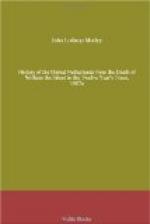When it is remembered that with this foremost power in the world affairs of greater or less importance were perpetually to be transacted by the representatives of other nations as well as by native subjects of every degree; that all these affairs were to pass through the hands of Lerma, and that those hands had ever to be filled with coin, the stupendous opulence of the one man can be easily understood. Whether the foremost power of the world, thus governed, were likely to continue the foremost power, could hardly seem doubtful to those accustomed to use their reason in judging of the things of this world.
Meantime the duke continued to transact business; to sell his interviews and his interest; to traffic in cardinals’ hats, bishops’ mitres, judges’ ermine, civic and magisterial votes in all offices, high or humble, of church, army, or state.
He possessed the art of remembering, or appearing to remember, the matters of business which had been communicated to him. When a negotiator, of whatever degree, had the good fortune to reach the presence, he found the duke to all appearance mindful of the particular affair which led to the interview, and fully absorbed by its importance. There were men who, trusting to the affability shown by the great favourite, and to the handsome price paid down in cash for that urbanity, had been known to go away from their interview believing that their business was likely to be accomplished, until the lapse of time revealed to them the wildness of their dream.
The duke perhaps never manifested his omnipotence on a more striking scale than when by his own fiat he removed the court and the seat of government to Valladolid, and kept it there six years long. This was declared by disinterested observers to be not only contrary to common sense, but even beyond the bounds of possibility. At Madrid the king had splendid palaces, and in its neighbourhood beautiful country residences, a pure atmosphere, and the facility of changing the air at will. At Valladolid there were no conveniences of any kind, no sufficient palace, no summer villa, no park, nothing but an unwholesome climate. But most of the duke’s estates were in that vicinity, and it was desirable for him to overlook them in person. Moreover, he wished to get rid of the possible influence over the king of the Empress Dowager Maria, widow of Maximilian II. and aunt and grandmother of Philip III. The minister could hardly drive this exalted personage from court, so easily as he had banished the ex-Archbishop of Toledo, the Inquisitor General, the Duchess of Candia, besides a multitude of lesser note. So he did the next best thing, and banished the court from the empress, who was not likely to put up with the inconveniences of Valladolid for the sake of outrivalling the duke. This Babylonian captivity lasted until Madrid was nearly ruined, until the desolation of the capital, the moans of the trades-people, the curses of the poor, and the grumblings of the courtiers, finally produced an effect even upon the arbitrary Lerma. He then accordingly re-emigrated, with king and Government, to Madrid, and caused it to be published that he had at last overcome the sovereign’s repugnance to the old capital, and had persuaded him to abandon Valladolid.




